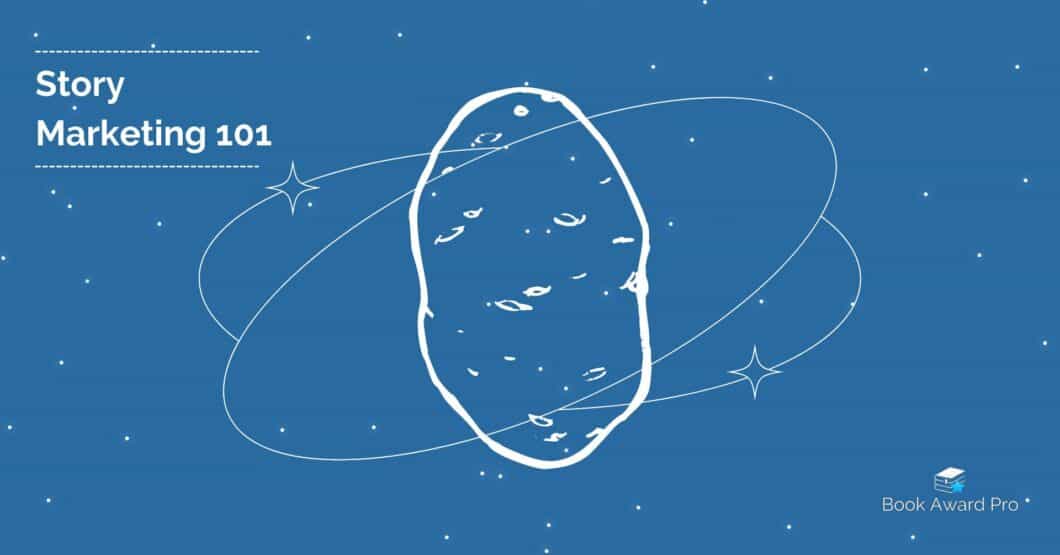Story Marketing 101: Andy Weir and the successful failure of The Martian

Book Award Pro
Fictional astronaut Mark Watney, from the book The Martian, survived on potatoes for over a year. In real life, he literally has a genus of potato named after him. That's story marketing.
An unlikely success story
After a serious run at being a professional author, Andy Weir couldn’t get any traction on his writing from audiences. Despite quitting his job for three years to focus on writing, he couldn’t get calls returned from literary agents, publishers, or book distributors.
Weir ultimately accepted that he just wasn’t cut out to be a mainstream writer. In a way, that’s when the magic started. Resigned to his fate, Weir decided that he would write about what truly excited him: a serialized story about a man stranded on Mars. He began to draft a simple plot about astronaut Mark Watney, left alone to fend for himself on Mars for many months. Weir wrote about all of the challenges Watney would face, as well as how a rescue could be mounted.
With no aspirations of appealing to a wide audience, or even being published at all, Weir wrote the story as a series of blog posts on a bare-bones website. He released each chapter sporadically, writing when he felt like writing. His story had an almost obsessive focus on details and scientific accuracy. Weir was a self-described orbital mechanics enthusiast (yes, that’s a thing) and amateur scientist.
After several months of releasing what would become The Martian, a funny thing started to happen: Weir attracted a readership of people who were just as into the hard science of space as he was. Weir says that his initial audience ran the gamut from biologists to physicists. Not only did they enjoy the story, but they enjoyed pointing out his occasional shortcomings in the science of the story. Weir was receptive to the feedback, changing previous chapters to correct the accuracy. His audience loved it, and became an army of unpaid evangelists online.
Although Weir initially distributed The Martian for free, he ultimately was pressured to release it on Amazon as a complete ebook, which he sold for just 99 cents. It became an Amazon bestseller.
Weir found himself being courted by literary agents, and the rest is history. His work became heralded as a “love letter to science”. The Martian won a Hugo Award for best new writer, which propelled its adaptation into a feature film starring Matt Damon and directed by Ridley Scott.
Andy Weir wasn’t a marketing genius, but he unintentionally wrote a playbook for story marketing that independent authors should study carefully. Here’s three big takeaways from his marketing, and how you can use them in your own story marketing.
Lean into your niche
Authors are smart to think about broad appeal, but sometimes attracting a small, but highly engaged, readership is even better. Weir found an underserved market that was looking for hard science fiction outside of techno and military thrillers. His readership was obscure, but powerful and vocal. What made The Martian surge in popularity was a core group of enthusiasts that approved of the science and became evangelists for Weir.
Ideas for your story marketing:
- Contact some experts on social media and ask if they can vet the science or history of your story. You might be surprised how many would be willing to do it. See if they would be willing to share their process on social media and you can do the same.
- Go on community based sites like Reddit or Discord and find small communities in your niche. Share your story, but don’t overtly market it. Ask for feedback on how to make it better!
- Find some local groups on apps like Meetup or Facebook and see if you can get their feedback.
- Remember, you’re not promoting your book, you're attracting interest by asking for advice.
Crowdsource
One of the pivotal scenes in the novel is a dramatic explosion. It occurs because the character Mark Watney makes a critical math error when trying to chemically manufacture water on Mars. In real life, the idea came about from Weir making the same error, and getting feedback from a number of chemists. They jokingly told Weir that his mistake would have probably killed poor Mark Watney had he tried it in the story. But instead of fixing the mistake, Weir came up with a better idea: What if Mark Watney really did almost kill himself?
Weir allowed his audience to become a part of the storytelling process by listening to them and letting the story go to unexpected places. He wasn’t overly-attached to a plot, and because of that, The Martian was able to take some unexpected twists and turns.
Ideas for your story marketing:
- Ask your followers “what would happen if?” and describe a certain plot in your story.
- Base a character’s appearance off a follower on social media, maybe even make it a contest.
- Ask an online group for a fresh take on an old troupe you’re finding in your story.
- Start a Patreon where supporters can vote on the fate of characters.

Serialize
Book series are popular, many publishers would prefer three short books over one long one. Prolific romance authors write novellas no longer than 10,000 words, and release several books a year. But what about one book, released over a long period of time? In the past few years, platforms like Kindle Vella have tried to capitalize on the trend of rapidly released content that can be read in just one session.
Weir says there was no strategy to his release cadence with The Martian. But slowly publishing chunks of serialized content proved to be a winning formula. Mark Watney faced a new threat to his survival every chapter, giving the story an episodic feel. This allowed momentum to build over time, as previous chapters continually marketed upcoming chapters.
Ideas for your story marketing:
- Consider if your story would be good for a platform like Kindle Vella or a story blog with serialized content.
- You can take a page from the romance genre and make your book available in short volumes for a low price.
- Market each release to build hype for the next, even by giving away the first chapter for free.
- When the story is completed, sell it as one volume. Add some extra value with original artwork or even new chapters.
Most importantly
Here’s the big takeaway from the success of The Martian: It’s never too early to start marketing. The days of locking yourself in a room and emerging one year later with a finished story are over. Building hype leading up to a full release will help you generate those precious pre-orders and launch day sales that build early momentum.
One of the pillars of a story marketing plan should be to use book awards buzz to ignite fanfare. Andy Weir even won the award for “Best New Writer” a full five years after it was first published on his personal website. You can enter your book into award contests before it is even published.
